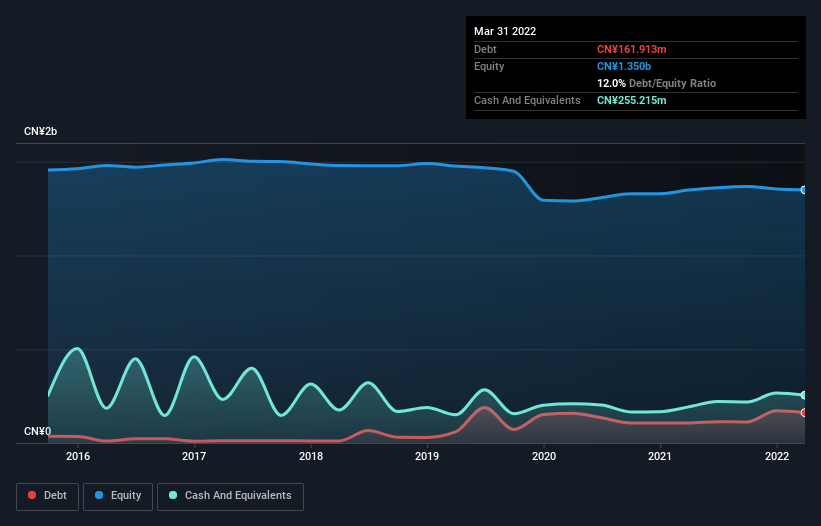Some say volatility, rather than debt, is the best way to think about risk as an investor, but Warren Buffett famously said that 'Volatility is far from synonymous with risk.' So it seems the smart money knows that debt - which is usually involved in bankruptcies - is a very important factor, when you assess how risky a company is. We can see that Zhejiang Shibao Company Limited (HKG:1057) does use debt in its business. But should shareholders be worried about its use of debt?
When Is Debt A Problem?
Debt and other liabilities become risky for a business when it cannot easily fulfill those obligations, either with free cash flow or by raising capital at an attractive price. If things get really bad, the lenders can take control of the business. While that is not too common, we often do see indebted companies permanently diluting shareholders because lenders force them to raise capital at a distressed price. Of course, debt can be an important tool in businesses, particularly capital heavy businesses. The first thing to do when considering how much debt a business uses is to look at its cash and debt together.
Check out our latest analysis for Zhejiang Shibao
What Is Zhejiang Shibao's Debt?
As you can see below, at the end of March 2022, Zhejiang Shibao had CN¥161.9m of debt, up from CN¥106.9m a year ago. Click the image for more detail. However, its balance sheet shows it holds CN¥255.2m in cash, so it actually has CN¥93.3m net cash.

A Look At Zhejiang Shibao's Liabilities
Zooming in on the latest balance sheet data, we can see that Zhejiang Shibao had liabilities of CN¥696.1m due within 12 months and liabilities of CN¥54.1m due beyond that. On the other hand, it had cash of CN¥255.2m and CN¥508.4m worth of receivables due within a year. So its total liabilities are just about perfectly matched by its shorter-term, liquid assets.
This state of affairs indicates that Zhejiang Shibao's balance sheet looks quite solid, as its total liabilities are just about equal to its liquid assets. So it's very unlikely that the CN¥6.58b company is short on cash, but still worth keeping an eye on the balance sheet. Succinctly put, Zhejiang Shibao boasts net cash, so it's fair to say it does not have a heavy debt load! There's no doubt that we learn most about debt from the balance sheet. But it is Zhejiang Shibao's earnings that will influence how the balance sheet holds up in the future. So if you're keen to discover more about its earnings, it might be worth checking out this graph of its long term earnings trend.
In the last year Zhejiang Shibao had a loss before interest and tax, and actually shrunk its revenue by 4.8%, to CN¥1.1b. That's not what we would hope to see.
So How Risky Is Zhejiang Shibao?
Although Zhejiang Shibao had an earnings before interest and tax (EBIT) loss over the last twelve months, it made a statutory profit of CN¥9.8m. So when you consider it has net cash, along with the statutory profit, the stock probably isn't as risky as it might seem, at least in the short term. We'll feel more comfortable with the stock once EBIT is positive, given the lacklustre revenue growth. There's no doubt that we learn most about debt from the balance sheet. However, not all investment risk resides within the balance sheet - far from it. For example Zhejiang Shibao has 4 warning signs (and 2 which are a bit concerning) we think you should know about.
If, after all that, you're more interested in a fast growing company with a rock-solid balance sheet, then check out our list of net cash growth stocks without delay.
Valuation is complex, but we're here to simplify it.
Discover if Zhejiang Shibao might be undervalued or overvalued with our detailed analysis, featuring fair value estimates, potential risks, dividends, insider trades, and its financial condition.
Access Free AnalysisHave feedback on this article? Concerned about the content? Get in touch with us directly. Alternatively, email editorial-team (at) simplywallst.com.
This article by Simply Wall St is general in nature. We provide commentary based on historical data and analyst forecasts only using an unbiased methodology and our articles are not intended to be financial advice. It does not constitute a recommendation to buy or sell any stock, and does not take account of your objectives, or your financial situation. We aim to bring you long-term focused analysis driven by fundamental data. Note that our analysis may not factor in the latest price-sensitive company announcements or qualitative material. Simply Wall St has no position in any stocks mentioned.
About SEHK:1057
Zhejiang Shibao
Researches, designs, develops, produces, and sells automotive steering systems and accessories in the People’s Republic of China.
Flawless balance sheet with proven track record.
Market Insights
Community Narratives



